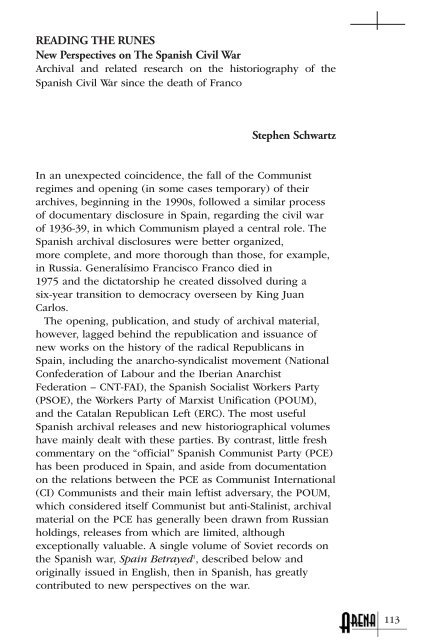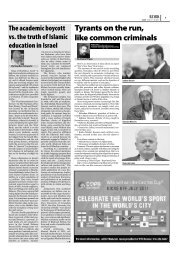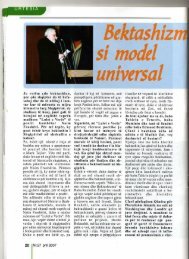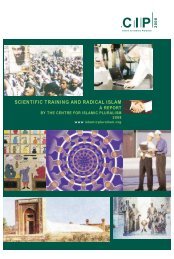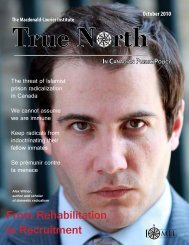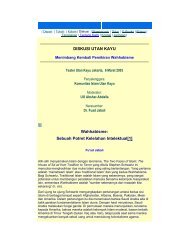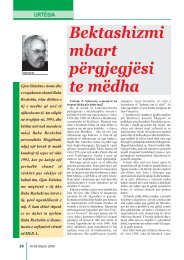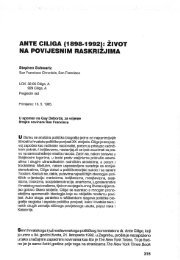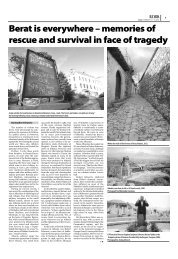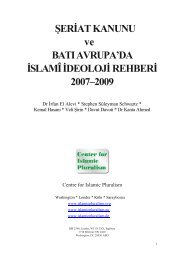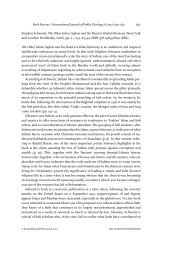READING THE RUNES New Perspectives on The Spanish Civil War ...
READING THE RUNES New Perspectives on The Spanish Civil War ...
READING THE RUNES New Perspectives on The Spanish Civil War ...
You also want an ePaper? Increase the reach of your titles
YUMPU automatically turns print PDFs into web optimized ePapers that Google loves.
<str<strong>on</strong>g>READING</str<strong>on</strong>g> <str<strong>on</strong>g>THE</str<strong>on</strong>g> <str<strong>on</strong>g>RUNES</str<strong>on</strong>g><str<strong>on</strong>g>New</str<strong>on</strong>g> <str<strong>on</strong>g>Perspectives</str<strong>on</strong>g> <strong>on</strong> <strong>The</strong> <strong>Spanish</strong> <strong>Civil</strong> <strong>War</strong>Archival and related research <strong>on</strong> the historiography of the<strong>Spanish</strong> <strong>Civil</strong> <strong>War</strong> since the death of FrancoStephen SchwartzIn an unexpected coincidence, the fall of the Communistregimes and opening (in some cases temporary) of theirarchives, beginning in the 1990s, followed a similar processof documentary disclosure in Spain, regarding the civil warof 1936-39, in which Communism played a central role. <strong>The</strong><strong>Spanish</strong> archival disclosures were better organized,more complete, and more thorough than those, for example,in Russia. Generalísimo Francisco Franco died in1975 and the dictatorship he created dissolved during asix-year transiti<strong>on</strong> to democracy overseen by King JuanCarlos.<strong>The</strong> opening, publicati<strong>on</strong>, and study of archival material,however, lagged behind the republicati<strong>on</strong> and issuance ofnew works <strong>on</strong> the history of the radical Republicans inSpain, including the anarcho-syndicalist movement (Nati<strong>on</strong>alC<strong>on</strong>federati<strong>on</strong> of Labour and the Iberian AnarchistFederati<strong>on</strong> – CNT-FAI), the <strong>Spanish</strong> Socialist Workers Party(PSOE), the Workers Party of Marxist Unificati<strong>on</strong> (POUM),and the Catalan Republican Left (ERC). <strong>The</strong> most useful<strong>Spanish</strong> archival releases and new historiographical volumeshave mainly dealt with these parties. By c<strong>on</strong>trast, little freshcommentary <strong>on</strong> the “official” <strong>Spanish</strong> Communist Party (PCE)has been produced in Spain, and aside from documentati<strong>on</strong><strong>on</strong> the relati<strong>on</strong>s between the PCE as Communist Internati<strong>on</strong>al(CI) Communists and their main leftist adversary, the POUM,which c<strong>on</strong>sidered itself Communist but anti-Stalinist, archivalmaterial <strong>on</strong> the PCE has generally been drawn from Russianholdings, releases from which are limited, althoughexcepti<strong>on</strong>ally valuable. A single volume of Soviet records <strong>on</strong>the <strong>Spanish</strong> war, Spain Betrayed 1 , described below andoriginally issued in English, then in <strong>Spanish</strong>, has greatlyc<strong>on</strong>tributed to new perspectives <strong>on</strong> the war.113
<str<strong>on</strong>g>New</str<strong>on</strong>g> <str<strong>on</strong>g>Perspectives</str<strong>on</strong>g> On <strong>The</strong> <strong>Spanish</strong> <strong>Civil</strong> <strong>War</strong>POUM’s governmental suppressi<strong>on</strong> in 1937. Tragically, thePOUM’s co-founder, Andreu Nin i Pérez (1892-1937), aprominent Catalan writer and labour figure, and c<strong>on</strong>seller(minister) of justice in the revoluti<strong>on</strong>ary Catalan Generalitat(regi<strong>on</strong>al government) of 1936, was murdered by Stalinists.<strong>The</strong> appointment of an alleged and unrepentant “Trotskyite” tothe justice portfolio in Catal<strong>on</strong>ia at the <strong>on</strong>set of the worstMoscow purge trials was a powerful repudiati<strong>on</strong> of the claimsof the Russian authorities and must have been perceived bythe Stalin leadership with excepti<strong>on</strong>al horror. While the POUMwas not Trotskyist in official terms, its anti-Stalinism kept itvery close to the Trotskyist movement, some Trotskyists foughtin its ranks, and it did not denounce Trotsky or his acolytes inthe Stalinist manner. But the full roster of POUM, Trotskyist,and anarchist victims in Spain, killed within the country, orkidnapped and liquidated elsewhere by Communists, wasprobably no more than 30 people. Trotskyist claims aboutwholesale murder of the POUM and anarchists seem to havereflected spite, in that the POUM had rejected the politicaladvice of Trotsky and his few <strong>Spanish</strong>, as well as hisinternati<strong>on</strong>al, followers. More important, however, both thePOUM and, unquesti<strong>on</strong>ably, the anarchist movement, weredeeply rooted in Catal<strong>on</strong>ia and could not be d<strong>on</strong>e away witheasily.<strong>The</strong> third historical error, which c<strong>on</strong>tinues to be repeated, isthe belief that Nin himself, a Soviet functi<strong>on</strong>ary from 1921 to1930, was a “secretary” for, or otherwise attached to the staffof, Le<strong>on</strong> Trotsky during the latter’s period of stateresp<strong>on</strong>sibilities. 3 Nin occupied a high post in the RedInternati<strong>on</strong>al of Labor Uni<strong>on</strong>s (Profintern) as well as serving inthe leading structures of the CI and the <strong>Spanish</strong> CommunistParty. During the internal struggle in the Russian CommunistParty (Bolsheviks) he became a member of an Internati<strong>on</strong>alCommissi<strong>on</strong> of the Oppositi<strong>on</strong>al Center, but did not workdirectly with or under Trotsky. Victor Serge recalled, “InMoscow I took part in the Internati<strong>on</strong>al Commissi<strong>on</strong> set up bythe Oppositi<strong>on</strong>al Centre, together with [Grigori] Zinoviev’sspokesman [Moisei Markovich] Kharit<strong>on</strong>ov, Fritz Wolf (whoso<strong>on</strong> capitulated, which did not stop him being shot in 1937),Andrés Nin, the Bulgarian Lebedev (or Stepanov, a clandestineOppositi<strong>on</strong>ist who betrayed us and later worked as aComintern agent during the revoluti<strong>on</strong> in Spain) and two orthree other militants whose names I have forgotten.” 4115
<strong>on</strong> anarchists in ficti<strong>on</strong>116Downgrading of Nin, c<strong>on</strong>sidered a major revoluti<strong>on</strong>arypers<strong>on</strong>ality in his own right, to a bureaucratic positi<strong>on</strong>subordinate to Trotsky, reflects the ignorance of foreignauthors who do not know of his prominence in the Catalanjournalistic and labor milieux, even before his departure forRussia.<strong>The</strong> late Catalan author Pere Pagès (1916-2003), known asVíctor Alba, who was my mentor in writing about the POUM 5 ,had dem<strong>on</strong>strated inexhaustible energy in seeking to“rehabilitate” the party’s reputati<strong>on</strong> by publishing books <strong>on</strong> it,even in Catal<strong>on</strong>ia at the end of the Franco era. It was thereforeunsurprising that two of the earliest volumes of republisheddocumentati<strong>on</strong> <strong>on</strong> the POUM, after Franco’s death, were issuedin 1977-78 at his instance. <strong>The</strong> first was La Nueva Era (<strong>The</strong><str<strong>on</strong>g>New</str<strong>on</strong>g> Era), a collecti<strong>on</strong> of articles from a revoluti<strong>on</strong>ary anti-Stalinist journal printed in Spain from 1930 to 1936. Moreuseful, however, was a compendium of all the basic theoreticaland political documents of the POUM produced during thecivil war, and titled La Revolución española en la practica (<strong>The</strong><strong>Spanish</strong> Revoluti<strong>on</strong> in Practice). 6 <strong>The</strong> latter book providedhistorians with their first primary source, after many years, <strong>on</strong>the activity of the party during the civil war.Opening of the <strong>Spanish</strong> archives<strong>The</strong> official process of archival release was slower. Unlike theformer Communist governments, the post-Franco regime hadno “reas<strong>on</strong>s of state” that would block the opening of most oftheir holdings, especially <strong>on</strong> the civil war. <strong>The</strong> organisati<strong>on</strong>and preparati<strong>on</strong> of documents for scholarly use was carriedout with admirable thoroughness, professi<strong>on</strong>alism, andtransparency – which made for a relatively l<strong>on</strong>g period ofwork by archival staffs.Some archives were, nevertheless, subjects of c<strong>on</strong>troversy.For example, the Franco state had established a GeneralArchive of the <strong>Civil</strong> <strong>War</strong> in Salamanca, to support a massivejudicial investigati<strong>on</strong> charging the civil war left with assortedcrimes, and evidence from which was utilized in individualcases against oppositi<strong>on</strong> pers<strong>on</strong>alities after the war. <strong>The</strong>Salamanca facility included the archives of the Generalitat ofCatal<strong>on</strong>ia, which, like other Republican source materials, hadbeen seized by the victors at the end of the war. <strong>The</strong>Generalitat demanded the reversi<strong>on</strong> of these resources to itsc<strong>on</strong>trol, and after a process lasting some 20 years, in whichboth the city government of Salamanca and the c<strong>on</strong>servative
<str<strong>on</strong>g>New</str<strong>on</strong>g> <str<strong>on</strong>g>Perspectives</str<strong>on</strong>g> On <strong>The</strong> <strong>Spanish</strong> <strong>Civil</strong> <strong>War</strong>Popular Party opposed the breakup of the collecti<strong>on</strong>, transferof the materials from Salamanca to Barcel<strong>on</strong>a was effected in2006. 7Other instituti<strong>on</strong>s became involved in the debate, which wasresolved by a decisi<strong>on</strong> of the <strong>Spanish</strong> legal system. <strong>The</strong>seincluded the successor to the Catalan secti<strong>on</strong> of the PCE, nowknown as Initiative for Catal<strong>on</strong>ia —<strong>The</strong> Greens (ICV), whichcalled for restituti<strong>on</strong> of the entire corpus of documents inSalamanca to all their original possessors. <strong>The</strong> CNT protestedthat its documentati<strong>on</strong> should not be returned to theGeneralitat, but to the anarchist organisati<strong>on</strong>, and the JewishCommunity of Barcel<strong>on</strong>a, the archives of which had also beenseized in 1939, similarly wanted them returned to its ownhandling rather than that of the Generalitat. But whiledifferent interests disagreed over the disposal of the archives,no attempts were disclosed to prevent scholars from usingthem freely, as have been seen in Russia.At the same time, nevertheless, official files <strong>on</strong> Francoistexecuti<strong>on</strong>s during the civil war have not been opened, assecret police files <strong>on</strong> the Stalin-era purges have been handedover to family members of Russian victims — a practice thatbegan under Soviet rule in the late 1950s. Materials describingrecent surveillance of anarchists, Basque extremists, and othersstill c<strong>on</strong>sidered enemies of the state have not been released inSpain, a practice different from that in such countries asGermany and the former Yugoslavia, where dossiers <strong>on</strong> therecruitment of informers and observati<strong>on</strong> of dissidents againstCommunism have been made accessible to the general publicand even, in the ex-Yugoslav case, printed and offered for sale.In additi<strong>on</strong>, some archives held abroad by left groups weretransferred to universities and foundati<strong>on</strong>s in Spain. Forexample, the Centre for Internati<strong>on</strong>al Historical Studies (CEHI)at the University of Barcel<strong>on</strong>a received a c<strong>on</strong>siderablecollecti<strong>on</strong> of POUM documents, and even inaugurated aMaurín-Nin Hall dedicated to the party’s main founders. 8In 1988, a major event took place, when the CEHI received,from the Nati<strong>on</strong>al Historical Archive in Madrid, the dossier ofthe Republican authorities <strong>on</strong> the 1937-38 trial of the POUMleadership (exclusive of Nin, who had been killed) by theSpecial Tribunal for Espi<strong>on</strong>age and High Treas<strong>on</strong>. <strong>The</strong> SpecialTribunal had been established hastily by the <strong>Spanish</strong>Republican authorities in 1937. <strong>The</strong> POUM leaders wereindicted for allegedly provoking the disorders in Barcel<strong>on</strong>a117
<strong>on</strong> anarchists in ficti<strong>on</strong>118known as the “May events” of 1937 (described by Orwell <strong>on</strong>the basis of his eyewitness) with the aim of carrying out amilitary insurrecti<strong>on</strong>. <strong>The</strong>y were further charged with deserti<strong>on</strong>from the Aragón fr<strong>on</strong>t in support of the Barcel<strong>on</strong>a protests;subversive propaganda; illegal possessi<strong>on</strong> of secret militaryinformati<strong>on</strong>; unlawful possessi<strong>on</strong> and trafficking in arms withthe intent of organizing an uprising; smuggling m<strong>on</strong>ey andobjects of value to France; use of secret codes, andmaintenance of relati<strong>on</strong>s and communicati<strong>on</strong>s with suspiciousforeigners. Some of the prosecutorial informati<strong>on</strong> read as ifborrowed directly from similar documents in the Moscowpurge trials.<strong>The</strong> dossier turned over to CEHI also included interrogatorytranscripti<strong>on</strong>s taken down from Nin during his period ofimpris<strong>on</strong>ment; materials from the 1938 trial of the POUMmilitary commander Josep Rovira i Canals (1902-68), chargedwith disloyal activities in the same matters treated by theearlier trial, and numerous ancillary memoranda <strong>on</strong> the POUMcomposed by secret police investigators. <strong>The</strong>re was noevidence of who had killed Nin or where his body wasburied. 9 <strong>The</strong> most sensati<strong>on</strong>al item in the dossier comprisedinvestigators’ notes <strong>on</strong> n<strong>on</strong>e other than George Orwell himself(born Eric Blair and described in the document as “Enric”, aCatalan form of “Henry”) and his wife Eileen Blair. In Homageto Catal<strong>on</strong>ia, Orwell had somewhat light-heartedly describedhis pursuit by <strong>Spanish</strong> secret police agents in Barcel<strong>on</strong>a. Butthe notes found in the POUM dossier revealed that theinvestigati<strong>on</strong> of the Blair couple was anything but innocuous.<strong>The</strong> an<strong>on</strong>ymous investigators described Eric and Eileen Blairas “pr<strong>on</strong>ounced Trotskyists],” which they most certainly werenot; and liais<strong>on</strong> agents between the British IndependentLabour Party and the POUM, also untrue. 10 <strong>The</strong> documentfinally included the phrase “Liais<strong>on</strong> with Moscow”, with nofurther explanati<strong>on</strong>. <strong>The</strong> implicati<strong>on</strong> is clear: Orwell was amajor target, and would probably have been liquidated orkidnapped and sent to Russia if caught. He was in much moreserious danger than he ever admitted, or perhaps was unawareof how great a risk he faced. Discovery of the Orwelldocument caused a minor sensati<strong>on</strong> in British media.<strong>The</strong> printed volume based <strong>on</strong> the POUM dossier, titled ElProceso del POUM (<strong>The</strong> POUM Trial), totaled 578 pages, andwas incomplete at that. 11 Investigative notes <strong>on</strong> otherforeigners were included in the documentary transfer but were
<str<strong>on</strong>g>New</str<strong>on</strong>g> <str<strong>on</strong>g>Perspectives</str<strong>on</strong>g> On <strong>The</strong> <strong>Spanish</strong> <strong>Civil</strong> <strong>War</strong>not published. <strong>The</strong> volume was, and remains, an indispensablesource for historians of the <strong>Spanish</strong> civil war and biographersof Orwell.<strong>The</strong> Legacy of MunisWhen Franco expired, Nin and Maurín, as well as Rovira andothers who had been tried in 1937-38, were dead, al<strong>on</strong>g withmost of the rest of the POUM leaders. Víctor Alba, although acourageous and tenacious defender of the party’s reputati<strong>on</strong>,had been a minor figure in the party youth movement and itsjournalistic efforts during the civil war. But two aggressive anddisputatious figures involved in the POUM trial survived andc<strong>on</strong>tinued publishing commentaries <strong>on</strong> historical events. <strong>The</strong>sewere Juan Andrade Rodríguez (1898-1981) and ManuelFernández Grandizo Martínez (1912-1989), the latter known bythe pen-name “G. Munis.” Andrade had been a member of thePOUM Executive Committee and was a prominent sympathizerof Trotsky. He compiled several worthwhile books based <strong>on</strong>primary sources, which were published posthumously. 12Fernández Grandizo, alias Munis, was born in Mexico butraised from childhood in the impoverished regi<strong>on</strong> ofExtremadura — the <strong>on</strong>ly part of Spain where, before the civilwar, Trotskyism was the dominant political trend. He had beenthe leader of the authentic <strong>Spanish</strong> Trotskyist group in thewar, known as the Bolshevik-Leninist Secti<strong>on</strong> and comprisingfewer than a dozen members. During the “May events” theydistributed a leaflet <strong>on</strong> the protestors’ barricades, as noted byOrwell. Fernández Grandizo appeared in the POUM trial as awitness, declaring that this group was unaffiliated with thePOUM. He and several members of his group were tried inBarcel<strong>on</strong>a in 1938 for the murder of a Russian infiltrator intothe POUM, Lev Narvich, who assisted in the arrest of Nin andthe other POUM leaders. Narvich had, in reality, been killed inan act of revenge by the POUM. But Munis and his comrades,after being held in excepti<strong>on</strong>ally bad c<strong>on</strong>diti<strong>on</strong>s, were foundguilty, sentenced to death, and kept in pris<strong>on</strong> until the fall ofBarcel<strong>on</strong>a to the Franco forces and their escape, al<strong>on</strong>g withmany thousands of anarchists, POUMists, and otherrevoluti<strong>on</strong>aries, across the French border.As “Munis,” Fernández Grandizo returned to his nativeMexico and in 1940 delivered the main eulogy at the funeralof Trotsky. In 1948, he published a polemical volume <strong>on</strong> thefailure of the <strong>Spanish</strong> revoluti<strong>on</strong>aries, Jal<strong>on</strong>es de derrota,promesa de victoria: Espana 1930-39 (Signposts of defeat,119
<strong>on</strong> anarchists in ficti<strong>on</strong>120promise of victory: Spain 1930-39). This incomplete andundocumented but excepti<strong>on</strong>al work was republished inFrance during the Franco era and then reset and republishedin Spain after the dictator’s death.Munis was str<strong>on</strong>gly critical of the whole array of radicalleaders during the war. Although from a Marxist perspective,he expressed respect for the anarchist CNT-FAI as the <strong>on</strong>lysignificant revoluti<strong>on</strong>ary labour movement in Europe. Hisvigorous militancy and a certain cachet derived from hisinvolvement in the “May events,” as well as his unlimitedstream of published commentary about events of the day,made his work attractive to young <strong>Spanish</strong> and some foreignradicals during the post-Franco transiti<strong>on</strong>. Volumes of hisarticles c<strong>on</strong>tinue to be published in Spain; his last writingsbefore his death were critical of Gorbachev as a false reformer.His case was unique; he was the last of the civil warrevoluti<strong>on</strong>aries to actively address c<strong>on</strong>temporary issues in atraditi<strong>on</strong>al, intransigently Marxist idiom.Anarchist documentati<strong>on</strong>Beside POUM and Trotskyist sources, a much larger corpus ofanarchist documentati<strong>on</strong> emerged in the post-Franco era. Ofthat mass of books and articles, <strong>on</strong>e volume appears asuniquely valuable. It is related, in a specific and unusualmanner, with recruitment by Franco’s nati<strong>on</strong>alist forces ofMoroccan volunteers, based <strong>on</strong> the anti-revoluti<strong>on</strong>ary leader’sformer service in the sector of Morocco then occupied bySpain. While it is an extremely obscure topic in thehistoriography of the civil war, the more radical defenders ofthe <strong>Spanish</strong> Republic — anarchists, anti-Stalinist communists,and Catalan nati<strong>on</strong>alists — gave serious c<strong>on</strong>siderati<strong>on</strong> tosupport for a nati<strong>on</strong>alist uprising in Morocco. <strong>The</strong> intent wasto undermine the capacity of Franco to enlist Moroccantroops. <strong>The</strong> Catalan left were especially interested becausetheir regi<strong>on</strong> had been c<strong>on</strong>vulsed for decades by radicaloppositi<strong>on</strong> to <strong>Spanish</strong> military involvement in Morocco. <strong>The</strong>late Abel Paz (pseud<strong>on</strong>ym of Diego Camacho Escámez, 1921-2009), the leading c<strong>on</strong>temporary historian of <strong>Spanish</strong>anarchism, mined official Catalan as well as radical-leftarchives to show the serious character of the <strong>Spanish</strong>revoluti<strong>on</strong>ary attempt to provoke a rebelli<strong>on</strong> in Morocco. In2000 he published La Cuestión de Marruecos y la RepúblicaEspañola (<strong>The</strong> Moroccan Questi<strong>on</strong> and the <strong>Spanish</strong> Republic). 13He reported that Sim<strong>on</strong>e Weil, the French philosopher then
<strong>on</strong> anarchists in ficti<strong>on</strong>122Río, the assassin of Trotsky, and including interviews with<strong>Spanish</strong> Communist exiles in Russia. 15<strong>The</strong> effect of these broadcasts was devastating for thereputati<strong>on</strong> of the <strong>Spanish</strong> Communists, in showing theirresp<strong>on</strong>sibility for two of the most notorious politicalassassinati<strong>on</strong>s in 20th century history. In Operació Nikolai, Ninwas restored to his proper reputati<strong>on</strong> as a Catalan literaryfigure, and Soviet agents were clearly identified as the authorsof the defeat of the revoluti<strong>on</strong>ary movement <strong>on</strong> theRepublican side during the civil war. But Operació Nikolai didnot name the agents who killed Nin, while Asaltando losCielos described the dreadful effects of Soviet secret policeservice <strong>on</strong> the Mercader family, and the sufferings of <strong>Spanish</strong>Republican émigrés in Russia, sent to labor camps for allegedanti-Soviet activity.In additi<strong>on</strong> to the release of the dossier <strong>on</strong> the POUM trial,and broadcast of Operació Nikolai, a c<strong>on</strong>siderable program ofacademic and publishing activity has been accomplished bythe Andreu Nin Foundati<strong>on</strong> (FAN), created in 1987 (the 50thanniversary of Nin’s murder) and which maintains a websiteincluding a m<strong>on</strong>thly bulletin. 16 <strong>The</strong> FAN tracks the availabilityof archival resources as well as the c<strong>on</strong>tinued publicati<strong>on</strong> ofdocuments, memoirs, and scholarly works dealing with themovement. A sustained interest in civil war history has beendem<strong>on</strong>strated by publicati<strong>on</strong> of a tourist guidebook distributedby the FAN, describing the main sites of revoluti<strong>on</strong>ary acti<strong>on</strong>during the c<strong>on</strong>flict. 17Outside Spain, a publishing enterprise in English, dedicatedto preserving the historical memory of <strong>Spanish</strong> anarchism, hasbeen established by the Scots anarchist Stuart Christie, aformer political pris<strong>on</strong>er in Spain. Christie’s main work hasbeen the publicati<strong>on</strong> in translati<strong>on</strong> of the three-volumecomplete history of the CNT during the civil war by JosepPeirats Valls (1908-89), the outstanding anarchist chr<strong>on</strong>icler,whose work is especially valuable for its transparency as wellas its basis in primary sources. (Peirats’ papers are held at theInternati<strong>on</strong>al Institute for Social History in Amsterdam.) 18All such c<strong>on</strong>tentious works, however, as well as newanalyses of the fate of the <strong>Spanish</strong> Republic, some of thembased <strong>on</strong> archival research and discussed further <strong>on</strong>, have hadless impact than a single volume of documents released fromthe Russian State Military Archive (RGVA) and the RussianInstitute of General History of the Russian Academy of
<str<strong>on</strong>g>New</str<strong>on</strong>g> <str<strong>on</strong>g>Perspectives</str<strong>on</strong>g> On <strong>The</strong> <strong>Spanish</strong> <strong>Civil</strong> <strong>War</strong>Sciences, supplemented by the collecti<strong>on</strong> of Russian secretservice messages intercepted and decrypted by the British, andknown as “Mask.”Menti<strong>on</strong>ed at the beginning of this article, Spain Betrayed:<strong>The</strong> Soviet Uni<strong>on</strong> in the <strong>Spanish</strong> <strong>Civil</strong> <strong>War</strong>, was edited by theAmerican historians R<strong>on</strong>ald Radosh and Mary R. Habeck incollaborati<strong>on</strong> with the Russian expert Grigory Sevostianov. Ithas been published in the U.S. in the “Annals of Communism”series, and in Spain, and has caused a literal revoluti<strong>on</strong> instudies of the civil war. It is the <strong>on</strong>ly volume in the “Annals ofCommunism” series with a visible impact outside the U.S. 19Comprising 538 English-language pages of documents andbrief commentary, Spain Betrayed provided unimpeachablesources <strong>on</strong> nearly every significant issue in Soviet relati<strong>on</strong>swith the <strong>Spanish</strong> Republic during the civil war. <strong>The</strong> textsinclude a CI directive from Moscow to the <strong>Spanish</strong>Communists as so<strong>on</strong> as the military insurrecti<strong>on</strong> against theRepublic commenced <strong>on</strong> July 17, 1936. This first such messagesent to the PCE, and the first printed in the volume, settles themost c<strong>on</strong>tested questi<strong>on</strong> of civil war history: the intenti<strong>on</strong>s ofthe Soviet government toward their anarchist and other rivalsin the <strong>Spanish</strong> revoluti<strong>on</strong>ary movement. <strong>The</strong>rein, Moscowstated that if the anarchist leadership refused to submit tounificati<strong>on</strong> demands by the <strong>Spanish</strong> Communists, theanarchists — then counting two milli<strong>on</strong> members, comparedwith a few thousand Communists — should be denounced as“strike breakers of the struggle against fascism in the workingclasses.” 20This blunt language dramatically but definitively refutesl<strong>on</strong>g-standing claims by the <strong>Spanish</strong> Communists and theirapologists that the Communists worked for a benevolent unityin the Popular Fr<strong>on</strong>t (FP), with the sole aim of a Republicanvictory. It should be noted, however, that the anarchist CNTdid not affiliate with the prewar FP, and the very large andradical <strong>Spanish</strong> Socialist party, while a signatory to the FPelectoral pact of 1936, refused to participate in the governmentproduced by its victory at the polls. Somewhat paradoxically,the POUM had been drawn into the FP and gained a seat inthe Cortes [nati<strong>on</strong>al parliament] from Barcel<strong>on</strong>a for itscofounder Maurín, who unfortunately was caught behind theFrancoist lines at the beginning of the war and was eventuallyimpris<strong>on</strong>ed. 21Spain Betrayed further revealed that less than a week after123
<strong>on</strong> anarchists in ficti<strong>on</strong>124the triumph of the left in the main cities of Barcel<strong>on</strong>a, Madrid,and Bilbao, with revoluti<strong>on</strong>ary euphoria having swept themasses, CI leader Georgi Dimitrov called <strong>on</strong> the Communiststo prevent radical measures in Spain, with the intenti<strong>on</strong> ofsupporting FP governments in France and Belgium, whichwere based <strong>on</strong> the integrity of the bourgeois order. Whileimprovised leftist militias had already departed Barcel<strong>on</strong>a forthe fr<strong>on</strong>t in Aragón, Dimitrov called for preservati<strong>on</strong> of aRepublican army of the ordinary kind. <strong>The</strong>se aspects of Sovietand <strong>Spanish</strong> Communist policy have been central to historicaldebate over the fate of the Republic since the publicati<strong>on</strong> ofworks by Orwell and Borkenau, who described Communistpolicy as counter-revoluti<strong>on</strong>ary.<strong>The</strong> documents in Spain Betrayed also outline thebackground for the delay in the decisi<strong>on</strong> of Stalin to directlysupport the <strong>Spanish</strong> left with arms and “advisers” — an acti<strong>on</strong>that did not begin until September 1936. <strong>The</strong> same collecti<strong>on</strong>includes reports by the main Soviet and CI pers<strong>on</strong>alities whowent to Spain, including the writer Ilya Ehrenburg (1891-1967), the French CI functi<strong>on</strong>ary André Marty (1886-1956), themilitary intelligence (GRU) officer Vladimir Gorev, the leadingBolshevik activist, diplomat, and former Trotskyist, VladimirAnt<strong>on</strong>ov-Ovsyeyenko (1883-1939), Iosif Ratner, a militaryattaché, and the ec<strong>on</strong>omic administrator Artur Stashevsky(1890-1937).But for a larger reading public, both in Spain and abroad,the most affecting revelati<strong>on</strong>s in the volume had to do withthe destiny of the Internati<strong>on</strong>al Brigades (IB), the Sovietrecruitedarmed detachments sent to strengthen theRepublican military. Spain Betrayed showed that Stalin’s purgeapparatus had been extended to the ranks of the IB. Onesentence leaps out of an an<strong>on</strong>ymous, c<strong>on</strong>fidential report sentto Moscow in mid-1937: about the XIIIth Internati<strong>on</strong>alBrigade, it stated, “This brigade is not destroyed; it has beenmurdered.” 22 An excepti<strong>on</strong>ally l<strong>on</strong>g, detailed, and candid reportsubmitted to Moscow at the end of 1937 by the Soviet militaryintelligence agent Moshe Zalmanovich (Manfred) Stern, widelypraised in Communist propaganda worldwide as “GeneralKléber” before his recall to Russia and disappearance in thepurges, revealed that the XIIIth IB, with a large Balkanrepresentati<strong>on</strong>, “fled from the fr<strong>on</strong>t.” <strong>The</strong> judgment of theSoviet officers in Spain <strong>on</strong> the XIIIth IB had been a subject ofdebate in memoirs and historical works prior to Franco’s
<strong>on</strong> anarchists in ficti<strong>on</strong>126delivered a powerful blow to the image in Spain of the Sovietsand other Communists in the civil war. This was not the leastbecause much of them originated with Świerczewski, whobecame deputy defense minister in the Polish Communistregime after the sec<strong>on</strong>d world war, and had the credibility ofcandor as well as Moscow’s l<strong>on</strong>g-standing approval.Finally, Spain Betrayed included a document that, for manyin Spain, has resolved the still-c<strong>on</strong>tinuing historical argumentover the “May events” of 1937. An an<strong>on</strong>ymous report written<strong>on</strong>ly weeks before the May combat, sent to General KlimentYefremovich Voroshilov (1881-1969), with the endorsement ofDimitrov, described increasing polarisati<strong>on</strong> between theCommunists and n<strong>on</strong>-Communists <strong>on</strong> the left. Rather than waitfor the crisis to turn into direct c<strong>on</strong>fr<strong>on</strong>tati<strong>on</strong>, the reportrecommended that the Communists “hasten it, and ifnecessary, provoke it.” 28 This has been interpreted, especiallyby Catalan historians — and not merely the defenders of theanarchists and POUM — as proof that the “May events” werethe product of a deliberate Communist plan c<strong>on</strong>ceived at thehighest reaches of the Kremlin. In sum, Spain Betrayeddemolished entirely the historiographical edifice <strong>on</strong> which adefense of <strong>Spanish</strong> Communist c<strong>on</strong>duct in the civil war hadbeen erected, and vindicated the critical authors who,beginning with Orwell, had accused the Soviet government ofsubverting the Republican cause.<strong>The</strong> Comintern in Latin AmericaBecause they spoke <strong>Spanish</strong>, many Latin American CI agentswere sent to the peninsula during the war. In 2004, theRussian historians Lazar and Viktor Kheifetz, father and s<strong>on</strong>,assisted by the Swiss historian Peter Huber, issued in Russiaand Switzerland a limited editi<strong>on</strong> volume, La Internaci<strong>on</strong>alComunista y América Latina, 1919-1943: Dicci<strong>on</strong>arioBiográfico (<strong>The</strong> Communist Internati<strong>on</strong>al and Latin America,1919-1943: Biographical Dicti<strong>on</strong>ary). 29 Based in large part <strong>on</strong>archival research in Russia by the Kheifetz pair, this bookrevealed that Andreu Nin, <strong>on</strong>ce he had g<strong>on</strong>e to Moscow, hadbecome popular am<strong>on</strong>g the Latin American Communistleaders, and served as the Kremlin’s expert c<strong>on</strong>troller of CImember parties from Mexico to Argentina.Many more fascinating figures appear in the Kheifetz,Kheifetz, and Huber universe of Bolshevik col<strong>on</strong>izati<strong>on</strong> inLatin America. <strong>The</strong> incredible Iosif RomualdevichGriguliavicius was born in a Karaite family — members of a
<str<strong>on</strong>g>New</str<strong>on</strong>g> <str<strong>on</strong>g>Perspectives</str<strong>on</strong>g> On <strong>The</strong> <strong>Spanish</strong> <strong>Civil</strong> <strong>War</strong>heterodox Jewish sect — in Lithuania under the tsars in 1913,and died in Moscow in 1988. In between, his exploits includedgetting a Sorb<strong>on</strong>ne degree, editing Communist periodicals inPolish, breaking Communist leaders out of jail in Brazil, andworking in Spain as a Soviet assassin implicated in the murderof Nin. He was sent back to Russia before returning to theWestern Hemisphere as an auxiliary in the murder of Trotsky;his task was to establish backup networks for that group ofkillers, in California as well as Mexico. Grigulevich, as he ismore generally known, fled to California after the Trotskyslaying. His espi<strong>on</strong>age tradecraft, and particularly his skill inreinventing himself, is so flamboyant as to seem doubtful. AfterWorld <strong>War</strong> II he was, using a false identity, named ambassadorto the Vatican and Yugoslavia by the leftist but anti-CommunistFigueres regime in Costa Rica! He used this post to plot themurder of Tito, although no attempt was carried out. In 1950he returned to Russia where he took up an academic post.Grigulevich has gained a belated prominence in works <strong>on</strong> thehistory of Soviet espi<strong>on</strong>age. In the same year the Kheifetz,Kheifetz, and Huber dicti<strong>on</strong>ary was published, a biography ofGrigulevich by the Costa Rican journalist Marjorie Ross waspublished. 30Other <str<strong>on</strong>g>New</str<strong>on</strong>g> WorksA few other books in the bibliography of the <strong>Spanish</strong> civil warpublished after the death of Franco are worthy of specialattenti<strong>on</strong>. Two outstanding volumes deal with whatincreasingly is a perennial theme of authors <strong>on</strong> the c<strong>on</strong>flict,the “May events”. <strong>The</strong> first was printed in 2003 in Barcel<strong>on</strong>aand dealt with the role of a much cited and little-understoodanarchist grouping, the Friends of Durruti, menti<strong>on</strong>ed byOrwell. <strong>The</strong> Friends of Durruti was c<strong>on</strong>sidered the main nodeof anti-Communist militancy in the CNT-FAI, and was led bythe journalist Santiago María (Jaume) Balius Mir (1904-80). Agreat deal of speculati<strong>on</strong> about the group was put in print, inseveral languages, but little solid documentati<strong>on</strong> apart from itsown periodical, El Amigo del Pueblo (<strong>The</strong> Friend of the People),its “manifesto,” Hacía una nueva revolución (Toward a FreshRevoluti<strong>on</strong>), and a small number of interviews with Balius.A book titled La Revolución Traici<strong>on</strong>ada (<strong>The</strong> Revoluti<strong>on</strong>Betrayed), authored by a young anarchist and situati<strong>on</strong>istwriter, Miquel Amorós, presents a definitive biography ofBalius, and is an indispensable source for <strong>Spanish</strong> warhistoriography. 31 Amorós drew from all the relevant archives127
<strong>on</strong> anarchists in ficti<strong>on</strong>128throughout Spain and internati<strong>on</strong>ally. Balius was a child of themiddle class and was pursuing medical studies when he wasstruck by poliomyelitis. Balius, the radical anarchist figure, andhis friend the POUM military commander Josep Rovira, two ofthe most remarkable and best-remembered am<strong>on</strong>g theirpeople, if sec<strong>on</strong>dary and least-studied figures in the civil war,had begun their political lives in Estat Català, the mainnati<strong>on</strong>alist cadre fighting for Catalan independence. Like manyearly 20 th century nati<strong>on</strong>alist movements, Estat Català hasbecome firmly respectable in Catalan public memory. Baliusformulated the excepti<strong>on</strong>al propositi<strong>on</strong> that the proletariat andthe bourgeoisie formed separate nati<strong>on</strong>s in every country. Butthe movement drifted to the right during the 1930s, wasexcluded from the regi<strong>on</strong>al government of the Generalitat afterthe events of 1936, and was c<strong>on</strong>sidered an equal enemy of theanarchists, POUM, and Communists. Its leaders, labeled asfascists, fled to France. Balius and Rovira evolved toward theWorkers’ and Peasants’ Bloc (BOC), a predecessor of thePOUM led by Maurín, although Balius ended up firmlyaffiliated with the CNT-FAI.A final, new and important accessi<strong>on</strong> to the bibliography ofthe <strong>Spanish</strong> civil war is a collecti<strong>on</strong> of letters by an AmericanTrotskyist woman active in the POUM, Lois Cusick Orr (1917-80s), published with supplementary materials by her husbandCharles Orr and edited by Gerd-Rainer Horn, a historianemployed at <strong>War</strong>wick University. 32 Lois Orr, as a strict Marxist,was hostile to Catalan nati<strong>on</strong>alism; even offensively so, with aparticularly provincial American manner. She worked in theEnglish-language press and radio department of the POUM.On September 27-30, 1936, she wrote a letter to her family inthe U.S., in which she noted that while all mail leaving the<strong>Spanish</strong> Republic was supposed to be censored, POUMcorresp<strong>on</strong>dence abroad avoided the censor because the partysent a twice-weekly automobile to France to use the postalservice there. In a sentence profoundly anticipatory of thetotalitarian future of Communism and its collapse, whiledeeply affecting in the sentiments it evokes, Lois Cusick Orrwrote, “POUM does not believe in censorship”. 33Notes1. 0See R<strong>on</strong>ald Radosh, Mary R. Habeck, andGrigory Sevostianov:Spain Betrayed: <strong>The</strong> Soviet Uni<strong>on</strong> in the <strong>Spanish</strong> <strong>Civil</strong> <strong>War</strong>,<str<strong>on</strong>g>New</str<strong>on</strong>g> Haven 2001; España Traici<strong>on</strong>ada, Madrid 2002.2. 0See George Orwell: Homage to Catal<strong>on</strong>ia, L<strong>on</strong>d<strong>on</strong> 1938,
<str<strong>on</strong>g>New</str<strong>on</strong>g> <str<strong>on</strong>g>Perspectives</str<strong>on</strong>g> On <strong>The</strong> <strong>Spanish</strong> <strong>Civil</strong> <strong>War</strong>reprinted and translated in many editi<strong>on</strong>s; Franz Borkenau:<strong>The</strong> <strong>Spanish</strong> Cockpit, L<strong>on</strong>d<strong>on</strong> 1937; Gerald Brenan: <strong>The</strong><strong>Spanish</strong> Labyrinth, Cambridge, UK 1943.3. 0See, for example, Bertrand M. Patenaude: Stalin’s Nemesis,L<strong>on</strong>d<strong>on</strong> 2009.4. 0Victor Serge: Memoirs of a Revoluti<strong>on</strong>ary, L<strong>on</strong>d<strong>on</strong> 1963, p.216. Stepanov, bornStoyan Mineff (1891-1959) and also knownas Stefanov, was assigned the revoluti<strong>on</strong>ary alias “Moreno”(“dark”) while active as leading Comintern representative inSpain. See the not-always-reliable work of Branko Lazitchand Milorad M. Drachkovitch: Biographical Dicti<strong>on</strong>ary of theComintern, Stanford 1986 (sec<strong>on</strong>d editi<strong>on</strong>.)5. 0Víctor Alba and Stephen Schwartz: <strong>Spanish</strong> Marxism vs. SovietCommunism: A History of the P.O.U.M., <str<strong>on</strong>g>New</str<strong>on</strong>g> Brunswick, NJ,USA 1988.6. 0Víctor Alba, ed.:La Nueva Era (<strong>The</strong> <str<strong>on</strong>g>New</str<strong>on</strong>g> Era), Madrid 1977;La Revolución espanola en la practica) <strong>The</strong> <strong>Spanish</strong>Revoluti<strong>on</strong> in Practice), Madrid 1978.7. 0An<strong>on</strong>ymous: “Els papers de Salamanca són ja a Barcel<strong>on</strong>a,seg<strong>on</strong>s el Ministeri de Cultura,” (“<strong>The</strong> Salamanca Papers arenow in Barcel<strong>on</strong>a, according to the Culture Ministry,”Europa Press [agency], Madrid, January 31, 2006.8. 0Joaquím Maurín Juliá (1896-1973), a former CI official, was thecofounder of the POUM with Nin. See CEHI printedcatalogue: História del POUM, Documents per el seu estudi(History of the POUM, Documents for its study) Barcel<strong>on</strong>a,19859. 0It should be noted that in both the main POUM trial andthe Rovira trial the <strong>Spanish</strong> Republican judiciary found thedefendants innocent of “high treas<strong>on</strong> and espi<strong>on</strong>age,” butguilty of involvement in the “May events,” resulting in minorpenalties. Notwithstanding the argument of certainhistorians that the <strong>Spanish</strong> Republic had been completelytaken over by the Russians, significant parts of the stateremained independent of their c<strong>on</strong>trol. <strong>The</strong> trivial sentencesimposed <strong>on</strong> the POUM leaders illustrate this fact; in Russiaor a completely Russian-dominated state, they would havebeen executed.10. Víctor Alba, Marisa Ardevol, et al., eds.: El Proceso del POUM:Documentos Judiciales y Policiales (<strong>The</strong> POUM Trial:Judicial and Police Documents), Barcel<strong>on</strong>a 1989, p. 75.11. Víctor Alba, Marisa Ardevol, et al., eds.: El Proceso del POUM,op. cit.129
<strong>on</strong> anarchists in ficti<strong>on</strong>13012. See, for example, Juan Andrade: Notas sobre la Guerra civil(Notes <strong>on</strong> the <strong>Civil</strong> <strong>War</strong>), Madrid n.d. [1986?]13. G. Munis: Jal<strong>on</strong>es de derrota, promesa de victoria: Espana1930-39 (Signposts of defeat, promise of victory: Spain1930-39), Madrid 1977; Revolución y c<strong>on</strong>trarevolución enRusia (Revoluti<strong>on</strong> and Counterrevoluti<strong>on</strong> in Russia),Llerena [Extremadura] 1999; Internaci<strong>on</strong>alismo, sindicatos,organización de clase (Internati<strong>on</strong>alism, Tradc Uni<strong>on</strong>s,Class Organizati<strong>on</strong>), Llerena 2009.14. Abel Paz: La Cuestión de Marruecos y la República Española(<strong>The</strong> Moroccan Questi<strong>on</strong> and the <strong>Spanish</strong> Republic), Madrid,2000.15. M. Dolors Genovès, director, and Llibert Ferri, investigator/screenwriter: Operació Nikolai (Operati<strong>on</strong> Nikolai), Barcel<strong>on</strong>a1992 (documentary film).16. Javier Rioyo and José Luis López-Linares, directors: Asaltando losCielos (Storm the Skies), Madrid 1996 (documentary film).17. See www.fundanin.com.18. Eladi Romero: Itinerarios de la guerra civil española (Guíadel viajero curioso) (<strong>Spanish</strong> <strong>Civil</strong> <strong>War</strong> Itineraries – Guidefor the Curious Traveler), Barcel<strong>on</strong>a 2001.19. See www.christiebooks.com. José Peirats: <strong>The</strong> CNT in the<strong>Spanish</strong> Revoluti<strong>on</strong>, 3 vols., Hastings (UK) 2001, 2003,2006.20. R<strong>on</strong>ald Radosh, Mary R. Habeck, andGrigory Sevostianov, op. cit.For a selecti<strong>on</strong> of the “Mask” intercepts, see Nigel West:Mask: MI5’s Penetrati<strong>on</strong> of the Communist Party of GreatBritain, <str<strong>on</strong>g>New</str<strong>on</strong>g> York 2005.21. Spain Betrayed, op.cit.,p.8.22. (Much detail <strong>on</strong> the internal nature of the FP was <strong>on</strong>lyavailable to foreign historians before 1975 thanks to thecited work of Munis.)23. Spain Betrayed, op. cit., p. 243.24. See Stephen Schwartz: Sarajevo Rose: A Balkan JewishNotebook, L<strong>on</strong>d<strong>on</strong> 2005 for a discussi<strong>on</strong> of the XIIIth IB.25. Spain Betrayed, op. cit., p. 437.26. Spain Betrayed, op. cit., p. 444.27. Spain Betrayed, op. cit., p. 453.28. Spain Betrayed, op. cit., p. 450.29. Spain Betrayed, op. cit., p. 194.30. Lazar Jeifets, Victor Jeifets, Peter Huber, eds.: La Internaci<strong>on</strong>alComunista y América Latina, 1919-1943: Dicci<strong>on</strong>arioBiográfico (<strong>The</strong> Communist Internati<strong>on</strong>al and Latin
<str<strong>on</strong>g>New</str<strong>on</strong>g> <str<strong>on</strong>g>Perspectives</str<strong>on</strong>g> On <strong>The</strong> <strong>Spanish</strong> <strong>Civil</strong> <strong>War</strong>America, 1919-1943: Biographical Dicti<strong>on</strong>ary)Moscow/Geneva 2004.31. Marjorie Ross: El secreto encanto de la KGB: Las cinco vidasde Iósif Griguliévich (<strong>The</strong> Secret Game of the KGB: <strong>The</strong> fivelives of Iosif Grigulievich), San José, C.R. 2004.32. Miquel Amorós: La revolución traici<strong>on</strong>ada (<strong>The</strong> Revoluti<strong>on</strong>Betrayed). Barcel<strong>on</strong>a 2003.33. Lois Orr with Charles Orr, edited by Gerd-Rainer Horn: Lettersfrom Barcel<strong>on</strong>a. L<strong>on</strong>d<strong>on</strong> 2009. On the Orr couple also seeAlba and Schwartz, op. cit.34. Letters from Barcel<strong>on</strong>a, p.72.131


